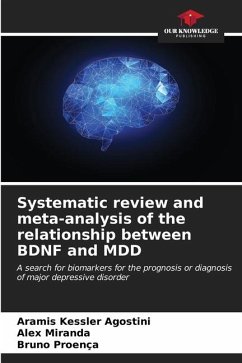Depression is a multifactorial illness that, according to the World Health Organisation, affects more than 300 million people worldwide. It is highly incapacitating and in its worst case scenario leads to suicide and death. The pathophysiology of depressive disorder has a number of theories such as mono aminergic, inflammatory and neurotrophin. This work is based on the latter, more precisely on one of the neurotrophins, brain-derived neurotrophic factor (BDNF). BDNF in its mature form acts on Trkbeta receptors, promoting neuronal survival, long- and short-term potentiation and hippocampal neurogenesis. While its immature form, proBDNF, acts on p75NTR receptors, promoting long- and short-term depression and apoptosis. The use of antidepressants can potentiate the expression of BDNF, so we hypothesised that there is evidence in favour of using BDNF as a diagnostic or prognostic marker. To verify this hypothesis, we carried out a systematic review and meta-analysis, using the largest secondary database (PubMed) as a source.
Bitte wählen Sie Ihr Anliegen aus.
Rechnungen
Retourenschein anfordern
Bestellstatus
Storno








